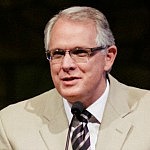
Quotes by Jerry Wragg
When God’s name and character are belittled, we ought to be indignant. But when others attack our lives and ministries, God remains the issue. He will bring everything to light at the proper time for the vindication of His glory and power (Matt. 10:26; 1 Cor. 4:5)… Taking personal offense at the attacks of others makes our reputation the issue and stores up personal “baggage” in our hearts, leading to bitter grudges.
The Scriptures always portray false teachers as deceptive and cunning, “disguising themselves as apostles of Christ” (2 Cor. 11:13-14). Jesus warned that they come to us in “sheep’s clothing” (Matt. 7:15) rather than being easy to spot. Their lies are “secretly” introduced (2 Peter 2:1) as teachings compatible with orthodoxy with only the slightest of nuances. When it came to the church at Ephesus, Paul didn’t hesitate to label these false leaders “savage wolves” (Acts 20:29, NASB), pack-hunters who stalk their prey by sending out a single wolf to increase the element of stealth and surprise. While unsuspecting sheep are drawn to the one, the entire pack lies in wait, ferociously exploiting the opportunity to destroy a life and scatter the others.
The more people engage in activities which their consciences warn them against, the more they become blinded to the truth, cannot see the dangers, and therefore perceive themselves to be “free” though they are deceived. Conversely, the evidence of a clear and maturing conscience is simply humility, submissiveness, and obedience (1 Peter 2:16-19; 3:16-17). Where these are absent it is a given that one’s conscience may “feel” free but is simply suppressed.
The conscience of one should not “rule” another in areas of liberty, but love should prevail in every consideration, even if it means eliminating the exercise of certain liberties (e.g. Paul in 1 Cor. 8:12-13).
This is a very difficult issue. The Bible teaches that we are never to get into a situation in which our innocent behavior is “spoken of as evil” (Rom. 14:16). For example, if what we are doing, though not sinful, could misrepresent the Lord, His church, His people, or His truth, to the world, we should avoid it. Not only are we to build up less mature believers in the body, but we are also to have character that is above legitimate question in the eyes of unbelievers (1 Peter 2:12-24; 3:13-17; 4:15). Some things are not evil but can easily be associated with questionable elements of society or even worldliness. Remember, if Christian freedoms are truly “freedoms,” then we should be as ready and willing to give them up as enjoy them.
We must ask ourselves, “For me personally, is this something the Lord would be pleased with?” If we have any doubts we should not do it (Rom. 14:20-23). If you believe that the Lord’s will for your life would not be violated, then you’re free to proceed (Rom. 14:5). But be careful here: Paul warns us to be completely free from doubts. In other words, we should not be involved in some “gray” activity without having sought counsel, studied God’s Word, prayed, and scrutinized all possible pros and cons before proceeding. If important issues are bypassed and the conscience is violated, the result is sin (Rom. 14:23).
If you spend a good bit of time defending your “privilege” to exercise a Christian liberty, perhaps you ought to let go of it for a time as a means of testing your motives. Is it truly a “freedom?” If so, it should be easily dispensed with for the sake of maintaining integrity before the Lord.
Humility is forged in the fires of an unmistakably clear vision of God, a biblically rich and abiding perspective of the cross, and a robust sense of man’s desperate sin-condition! When confronted with these realities, our deficiencies are properly magnified and successes are never allowed to take on a life of their own. A right view of God instantly brings us to the end of ourselves.
When we look down on others with haughty judgment, we invoke the same compassionless treatment from God toward our infirmities. What a terrifying response from the living God! Belligerent people are told they can expect to be handled by God, not according to His tender compassion, but with severity matching their contempt of others. Such words should sober even the most hardened heart and result in a fresh realization that self-righteousness tops God’s list of man’s most despised iniquities (Prov. 6:16-19).
The trustworthy leader, then will serve God best by feeding others with God’s food, reproving them with God’s Word, tending them with God’s heart, and disciplining them with God’s grace.
Defending our personal reputations by going on the attack directs attention toward us instead of toward the authority and glory of God. Criticism should be challenged, not when our reputations are maligned, but when God is.
The shepherd is called a watchman for good reason! He can never neglect the safety of his flock, nor be indifferent or reckless concerning their constant need for food and shelter. If he becomes timid and self-preserving, he will run at the first sign of trouble and the sheep are doomed. If he miscalculates the seriousness of his duties and becomes careless or casual, the flock will not be spared.
A heart of integrity is cultivated by striving to maintain a clear conscience. Our consciences are the internal mechanism given to us by God to drive us toward sincerity. Like an internal accountability partner, the conscience acts as a witness in our hearts and minds to either “accuse or even excuse” our actions (Rom. 2:15). When we inform the conscience with biblical truth we are telling it to accurately hold us in check against the standard of Scripture. The conscience itself is not our benchmark, but if kept clear and clean it becomes a powerful instrument of integrity as it drives us toward the grand, inflexible benchmark – God’s Word.
In spite of grand accomplishments and a large following, a leader without character is just another image, a cultural icon for the moment that is sure to crash and burn, replaced by tomorrow’s new and improved version.
Our fleshly ambitions are duly starved when we yield to the plans and purposes of God, especially when our questions go unanswered. The cross of Christ teaches us to rest in the knowledge that, if God was willing to reconcile us while we were enemies, we can trust Him to lead us in the way of abundant life. Humility is the fruit of willingly coming under His perfect leadership.
The contemporary church has been hemorrhaging truth and pumping in self-worship at such a rate that unbelievers, longing to drown their guilt and angst in religious renewal, find churchgoing a welcome and undemanding refuge. And why shouldn’t they? The average fad-soaked postmodern worship service has just enough morality to soothe the secular conscience and enough worldliness to leave superficial Christians feeling right at home.
When we’re angry at people and circumstances, we are really lashing out at God’s good providence. Instead of kissing the hand that afflicts us, we’re demanding that God order our lives by our script, our assessment of people, our comfort level.
The straightforward truth of Scripture is able both to open blind eyes and transform the heart (Psm. 19:7-11). Supernatural discernment comes from a mind saturated with truth (Psm. 119:97-104). It brings clarity to flaws, liberates the conscience (Jas. 1:25), uncovers the deepest issues of the inner man (Heb. 4:12), and fully equips the believer for a life of pleasing God (2 Tim. 3:16-17).
True confession involves seeing sin as God defines it, without mitigation or blurring of the lines. Taking ownership of every nuance of offense caused by our sin and bearing the weight of it.
It is amazing to me how many good deacons try desperately to be elders because they’ve concluded that there’s greater impact or status at the elder level. The result is a person carrying leadership burdens he was never gifted to bear, while the need for godly deacons goes unmet.
Integrity is the consistent harmony of convictions and conduct… The opposite, of course is hypocrisy… Integrity is having an untarnished moral character both publicly and when no one else is around.
Ironically, asking someone to cultivate humility is a bit like asking him to think about himself without thinking about himself.
Leadership…is the God-given ability to influence others through the power of a godly life and the wisdom gained in the practice of truth.
Instead of yielding to the temptation of pride and fear of man, we ought to consider every criticism as a providential gift from the Lord to teach us some beneficial lessons: 1. Criticism drives us to prayer – A greater degree of dependency results when we’re burdened over the criticism of others. We’re compelled to take every matter before the Lord so that our heart is guarded (Phi. 4:6). 2. Criticism drives us to the Scriptures – We are constrained to search the word of God for clarity, wisdom, and understanding (Psm. 119:98-100; Pro. 3:5-6; 2 Tim. 3:16-17). 3. Criticism refines our communication skills – We benefit from having to rearticulate what we believe in clearer terms and a more careful disposition (Eph. 4:29; Col. 4:6). 4. Criticism forces us to examine our hearts – Criticism causes us to look carefully at our attitudes and motives, and we are reminded of our own sinfulness (1 Cor. 4:3-5; Gal. 6:4-5). 5. Criticism produces spiritual endurance – Being criticized may be painful, but God uses it to wean us from our own resources and make us stronger in His grace and strength (Jas. 1:2-4; 2 Cor. 12:7-10). 6. Criticism provides unique opportunities to model godly humility – When others disagree, even sharply, we should be an example of humble submission to the Lord’s sanctifying grace in our lives (Pro. 9:8-9; 12:15). 7. Criticism offers greater opportunity to give God glory – God is exalted and His glory magnified when His servants bear up graciously under harsh treatment (1 Pet. 2:20; 3:15-17).
When criticism comes, we must remember that our response is what we are modeling for others. The following principles help us eliminate defensiveness and pride: 1. Search for any part of the criticism that is true and own it (Psm. 51:4). 2. Make no demands on others to treat you as if there’d never been an offense (Psm. 138:6; Pro. 3:34; Mat. 3:12; 1 Pet. 5:6-7). 3. When a criticism has no merit, seek to understand how the person could’ve drawn their conclusions. 4. If a complaint is leveled with sinful attitudes, forgive the offense quickly and lavishly, exercise self-control, and respond with carefully chosen words and attitudes.
Summarized from: Exemplary Spiritual Leadership, DayOne, 2010, p. 99, Used by Permission.
Endurance comes from minimizing excess baggage and maximizing efforts to achieve God’s battle objectives.
If our motives for study and meditation are spurious, driven largely by curiosity, obligation or intellectual pride, there will be no real benefit top the soul… [Are we] yielding to every word that comes from the mouth of God (Mt. 4:4)?
Temptation arises and the conscience warns of impending danger – Rationalization: “Because I already hate sin as a general rule, I can be near temptation without desiring it or becoming vulnerable” Temptation intensifies – Rationalization: “I’ve been doing well spiritually, what possible damage could result from merely ‘noticing’ trouble?” Sinful desires begin to consume the thought life – Rationalization: “My life is very difficult, so how am I supposed to be strong all the time? Can I be expected to hold off every powerful enticement when I’m under such pressure?” The conscience screams reminders about truth, family, friends, and consequences – Rationalization: “Since I’m alone, none of those I love will be affected; and besides, this is a small sin compared to what I’ve seen others do.” Sin prevails with the attendant guilt – Rationalization: “I’m not as bad as others; I know God will forgive me; I’ll just leave this between me and Him; I don’t need anyone’s help because they’ll just be judgmental.” Sin continues as a pattern, truth becomes dull, and sensations of guilt fade – Rationalization: “People can be so legalistic; they think they’re the only ones that do anything right; God is much more loving and He wants me to be happy.”
Each time our consciences “sound off” we can either muffle or unleash the volume of their impact. Prompt obedience sharpens the clarity of truth’s familiar sound, causing our spiritual senses to go on high alert. The more we obey, the greater affirmation we have that we are honest and genuine. A highly trained, truth-sensitive conscience will give us no rest when we edge toward compromise. If, instead of resolutely fleeing sin, we suppress the truth through rationalization and compromise, the clearest resonation of right and wrong will become faint. Do this enough times and no bell of truth will ring at all!
The Christian community tips its hat to the nobility of meekness, but in practice pride often wins the day.
Today’s emphasis on packaging the gospel according to cultural demands doesn’t beautify truth but dresses up error.
Spiritual credibility springs from a holy and pure life. Righteousness may not get the popular vote, but it should have no rivals in the preparation of an effective leader. From the pulpit to the pew, nothing is more stabilizing, more admirable, more compelling among the leadership qualifications than our personal holiness.
Criticism should be viewed as a tool for growth and change. Several temptations arise when we experience criticism. 1. We fear the loss of respect; 2. We look for reasons to challenge the data; 3. We search for flaws in the process; 4. We point out weakness in the other person; 5. We demand credit for our strengths; 6. We play the martyr, reeling under the unjust complaints of others. Yet, when we run away from the slightest hint of criticism, we forfeit the very means by which our Lord wants to make us more effective and godly.
The moment we imagine that we have exhaustively assessed the sin of our hearts, we have planted, watered, and harvested a crop of pride.
A ministry mentor, John MacArthur, has said to me on numerous occasions that “when a man falls, he doesn’t fall far.” In other words, a serious breach of leadership integrity does not occur in a vacuum. Men who have, by the grace of God, forged a pattern of moral veracity are not suddenly seduced by a life of lies and hypocrisy. Betrayal of this sort slowly percolates out of the heart over time with a host of smaller, virtually undetected compromises. When an integrity scandal breaks, the fall of that leader is more like a short hop!
The grace that saves the sinner is the power that must supply the sinner.

